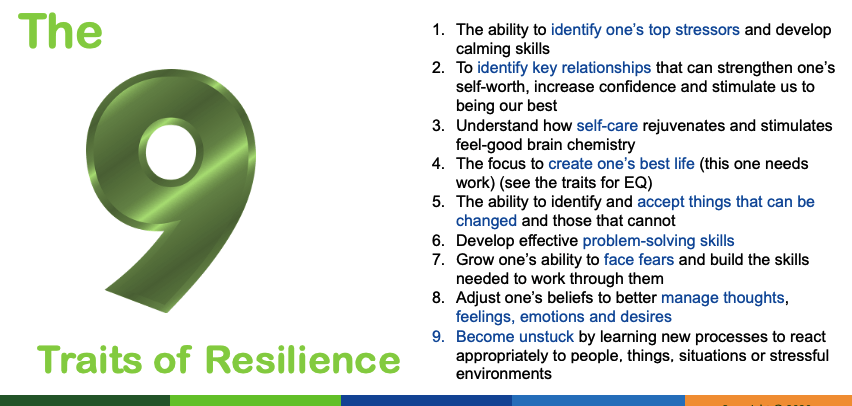The 9 traits of a Resilient Mind
…for enhanced mental well-being and performance
As we advance our understandings of neuro, behavioral and social sciences it is possible to help people increase their resilience to ward off stress and mental health challenges. Think about what can be more important than feeling confident with a sense of mental well-being. It’s the foundation to almost everything important to us.
The challenge is how do you make this training affordable and accessible to all sectors of our society?
The Resilient Mind Project has a solution:
Although there are 9 traits to resilience, the first trait: Know when your psychology shifts into a stressful escalated state and work to bring it back to a calm state, is the single most important factor among all of them. It can be taught to any person who has an open mind set or what we term as, readiness to change. It is perhaps one of the greatest returns on investment a person can make to his or her well-being.
Learning to move from an escalated state to a calm state:
It’s 7am and John and his wife are having their morning coffee. Both of them are content, feeling connected and confident about their day. At 7:05 John gets a text about an issue that came up at work and at the same time, his wife brings up a health issue with their new baby. Presto John moves into an escalated state, one that can be ranked an 8 out of 10 on the stress scale. How can it be that his psychological functions moved from a 2 (calm) out of 10 to an 8 in a nano second? Now that John was stressed, the union he had with his wife is broken, he is stricken with fear and has shifted from the executive function of his brain to the rear fight, flight and freeze area.
Now fast forward to week 3 of resilience training, John and his wife are learning skills on how to deal with these types of situations and such stressors more effectively. It won’t be an instant fix for them, but in 10 weeks, the effect size of resilience training is on an average of 18% for participants.
How to use the calming skills:
Calming skills can be viewed as a brain hack to create awareness of when you move from a regulated state to an escalated state and how to bring it back to the regulated state. Most of us end up staying in the escalated state long after an episode, allowing the hormone cortisol to wreak havoc on our psychological function, relationships and effectiveness at work. But because most of us, just like John or his wife earlier, never had the opportunity to be trained in managing our psychological functions through the use of these calming skills, no wonder all of us suffer.
At first, learning how to use the calming skills is like acquiring the faculty of balancing as a kid, when beginning to ride a bike. You need someone to run along side you till you get it, and then for the rest of your life, you got it! Learning to de escalate yourself with the calming skills is much the same. The training combined with mentoring can fast track a person in becoming successful in learning these soft skills .
The Resilient Mind project provides all the scientifically proven tools that helps build resilience in people. Whether you are an individual looking for some direction to be able to become a more resilient and happier version of yourself; or a business leader looking forward to creating resilient and more profitable organizations; or a healthcare provider looking forward to partner with us and play your part in creating a more resilient planet, The Resilient Mind project has something for you.
So, contact us now for more information and start your resilience journey with us.
Visit www.theresilientmind.life or get in touch with us at noelle.leemburg@theresilientmind.life
This is a win, win, win proposition for the individual, the organization, healthcare providers and everyone involved.







